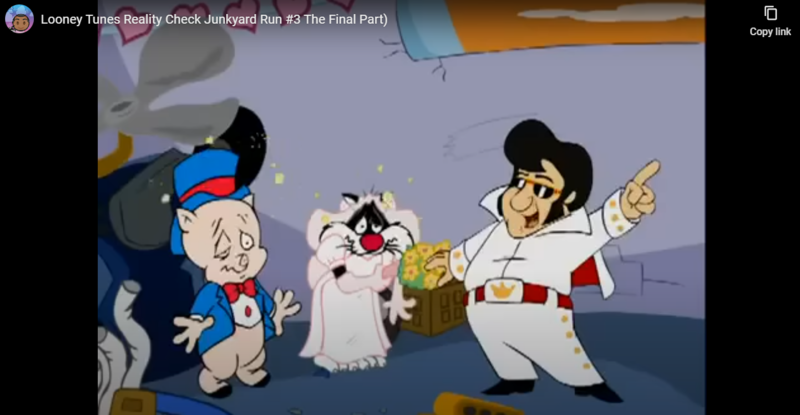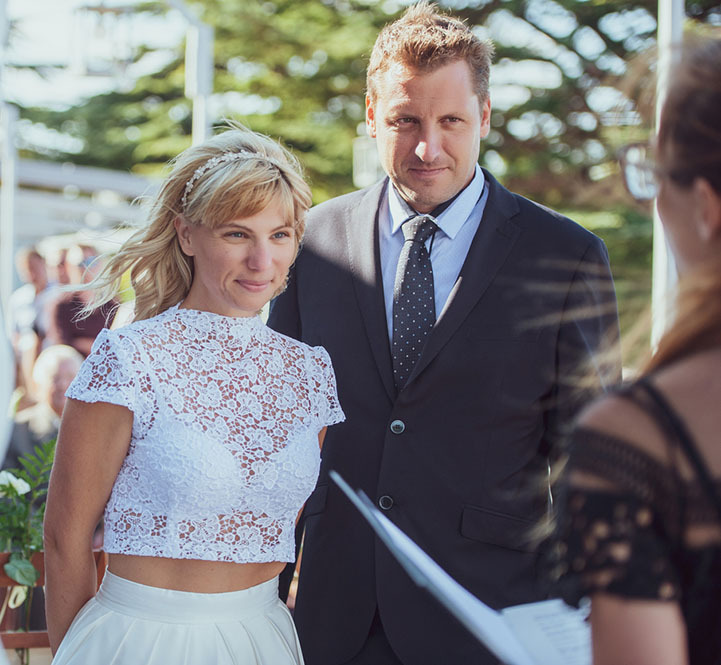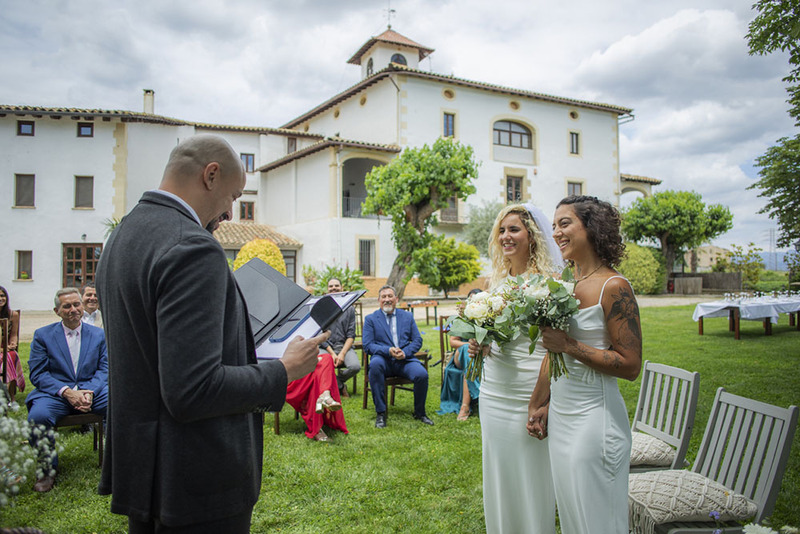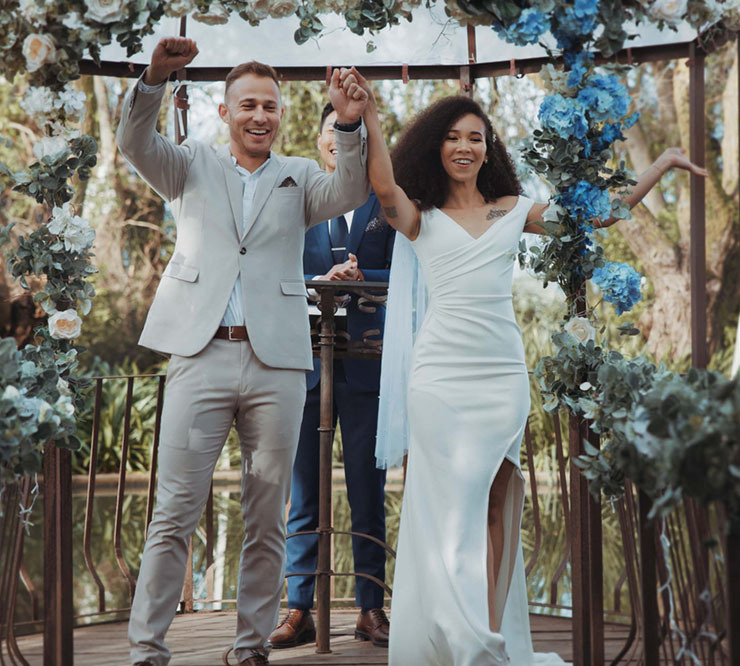AMERICAN WEDDINGS BLOG
Stay up to date with the latest wedding ceremony trends, script writing inspiration, tips and advice for first-time officiants, and news that matters to couples and wedding ministers.
Stay up to date with the latest wedding ceremony trends, script writing inspiration, tips and advice for first-time officiants, and news that matters to couples and wedding ministers.
Published Monday, Nov. 18th, 2024
Last updated Tuesday, Nov. 26th, 2024

“By the power vested in me, I now pronounce you husband and wife!”
This line is an iconic part of the traditional wedding ceremony. We hear it in movies, television shows, and even cartoons!

"By the powers vested in me, I pronounce you - married!" is a line that shows up everywhere, from tv and cartoons to the real-world weddings of our friends and family members. But what does it mean? (Above: Screenshot from Looney Tunes’ The Junkyard Run #3. Sylvester and Porky stop at a Las Vegas wedding chapel where an Elvis-impersonator wedding officiant declares: “By the power vested in me, I pronounce ya... hitched!”)
This familiar phrase is said during one of the last parts of a wedding ceremony, called ‘The Pronouncement of Marriage.’ Sometimes it’s called ‘The Wedding Pronouncement,’ or simply ‘The Pronouncement.’ (Click the link below to learn about the parts of a wedding ceremony.)
But what does ‘By the power vested in me’ actually mean? And do you have to say it to officiate a legal wedding ceremony, or can you say something else instead?
Let’s take a look! Use the tips below to write a personalized wedding ceremony script – or just impress your friends with your officiant-know-how.
Looking for a Wedding Officiant Script with '"by the power vested in me" included? Visit the AMM Library: Wedding Ceremony Scripts

What does 'by the power vested in me' mean during a wedding ceremony? (Photo: CasarsaGuru /iStock)
The phrase "by the power vested in me" means that you have been given the legal authority or ‘power’ to do something. In terms of a wedding, it means that you – the wedding officiant – have the authority to perform a wedding.
The words that come right after this phrase give the audience more information, and what you say next depends on where the wedding takes place and what type of officiant you are.
For example, you might say:
“By the power vested in me by American Marriage Ministries, I now pronounce you marry.”
This example means that you have been given the authority to officiate a wedding by becoming an ordained minister online with American Marriage Ministries. This is important because most states have rules about who can officiate a legal wedding, such as an ordained minister.
Or you might say:
“By the power/s vested in me by the State of Arkansas and American Marriage Ministries, I now pronounce you married.”
This example means that in addition to your ordination through American Marriage Ministries, you have taken the required steps to register your ordination with the State of Arkansas to perform a legal marriage ceremony. This is important because some states require a minister to register with the government before a wedding.
Some wedding officiants might say:
“By the power vested in me by God, I now pronounce you married.”
This example is usually used by religious officiants marrying a religious couple who see marriage as a sacred covenant, or special promise to God. It means that you have been given the authority to perform a religious wedding by your relationship with God, often through ordination as a minister or priest (such as becoming ordained online with American Marriage Ministries).
Of course, some wedding officiants say: “By the power vested in me, I now pronounce you married.” They leave the phrase in its simplest form, without adding where their authority to officiate a wedding comes from.
Which leads us to the next question…

Do you have to say 'by the power vested in me' when marrying someone? No, not those exact words. But a wedding officiant does have to 'pronounce' the couple married as part of the ceremony. (Photo: DarioGaona / iStock)
Does a wedding officiant always have to declare, “By the power vested in me?” for a wedding ceremony to be legal? Or, what if the wedding officiant doesn’t say “By the power vested in me?” What happens then?
This might surprise you: You don’t have to say “by the power vested in me” when you officiate a wedding! But –
But you do need to say the next part: “I pronounce you married!” Or at least words that are similar in meaning to these, that show the couple that you, the officiant, are legally joining them in the contract of marriage. This formal statement is called the ‘Pronouncement of Marriage’, and it’s one of the things that a wedding officiant is legally required to say during a wedding ceremony. (The other part an officiant must include is the ‘Declaration of Intent.')
The phrase ‘by the power vested in me’ is a great example of a wedding custom, because it has been said at weddings for centuries. Wedding guests might expect you to say it, but you don’t have to say it for the marriage ceremony to be legal.
Related: Are there legal wording requirements in a wedding ceremony?
As mentioned above, the officiant says ‘by the power vested in me’ right before pronouncing the couple legally married at the end of the wedding ceremony, usually followed by 'you may now kiss!'. Click the article linked below to see a simple outline of a wedding ceremony.
However, the exact wording for this part of the ceremony is up to you! Which leads us to the last question…

When does a wedding officiant say 'by the powers vested in me' during a wedding? Right before pronouncing the couple married at the end of the wedding ceremony! (Photo: Jacob Wackerhausen / iStock)
Some people like these traditional sounding words and want to include them in their wedding ceremony. But other people think the phrase sounds too stuffy, too formal, or too religious. Or maybe you want to write a funny wedding ceremony script and say this part in a funny way!
There are lots of ways to get creative with ‘The Wedding Pronouncement.’
If you are writing a lighthearted or funny wedding ceremony script and are ordained online with American Marriage Ministries, you might say:
“By the power vested in me by the internet and this handsome couple, I pronounce you married!”
If you’re writing an informal but intimate elopement ceremony script, you might say:
“It is my great honor and joy to pronounce you wife and wife.”
For a spiritual wedding ceremony you might say:
“And now, with the power entrusted in me by this loving Universe, and with all the love in my heart, I pronounce you married.”
Good things happen when friends and relatives help out at the wedding ceremony! Ask a friend or family member to officiate your wedding with free online ordination through American Marriage Ministries (AMM).
|* custom-button, "https://theamm.org/ordination-application", "ORDAINED MINISTER ONLINE APPLICATION" *|
Why AMM? American Marriage Ministries is an inclusive nondenominational internet church that ordains and trains ministers to officiate marriage ceremonies. We are a recognized 501(c)(3) nonprofit church, and help people from all backgrounds and beliefs become ordained ministers for weddings. Our online ordination is free, accessible, and never expires.
Officiating weddings is an incredible honor, and a great way to show your love and support for the people getting married. As a wedding officiant, you will help to create memorable ceremonies and memories that last a lifetime.
AMM Ministers can legally officiate weddings in every state* (it's much harder in Virginia, where we're looking into our options). After getting ordained with AMM, you might need to register your ordination with your local county clerk’s office. Click the link above to get started!

Become an ordained minister online with American Marriage Ministries and officiate wedding for friends and relatives. (Photo: franckreporter / iStock)
Become a Wedding Officiant with Our Free Online Ordination!